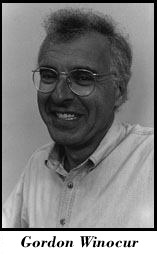
|
Winocur's memory research wins more medical dollars
by Martha Tancock
Winocur has taught
psychology and conducted memory research at Trent since 1971. At the
moment, his research activities are based at Trent and the Rotman Research
Institute of Baycrest Centre for Geriatric Care in Toronto. There, he and
his research partners have explored the neuropsychology of memory disorders
in old people and brain-damaged patients. One of their findings is that the
elderly who live active, stimulating lives have better memories and can
learn faster than their peers in old age homes. Biology plays a relatively
small part in memory loss in normal aging. Winocur and his colleagues have
identified two brain regions -- the hippocampus and the prefrontal cortex
-- as being particularly important and part of their research is concerned
with specifying roles these areas of the brain play in memory.
"Prof. Winocur's
continuing success in extremely tough MRC competitions is a reflection of
how highly regarded he is by colleagues in psychology and the health
sciences areas," says Paul Healy, dean of research and graduate studies.
"His work is novel, creative and fascinating. Clearly he is a world leader
in new studies of the functioning of the human brain and the problem of
memory loss, and he brings a great deal of credit to Trent through his
research achievements."
Winocur and
University of Toronto's Morris Moscovitch will receive $76,805 per year for
the next five years to further their research. They have discovered that a
damaged hippocampus, deep in the centre of the brain, can interfere with a
person's ability to acquire and store memories whereas a damaged prefrontal
cortex impairs the ability to retrieve them. Being able to characterize
which type of memory loss could "ultimately lead to therapeutic
treatments," including the development of drugs and behavioral strategies
to "selectively act on these different regions and enhance memory," said
Winocur in a recent interview.
Winocur's research is
taking a major new thrust. He is studying old people's ability to retrieve
memories from the remote past. Old people, such as patients with
hippocampal lesions, have difficulty remembering recent experiences but no
problem recalling really remote memories. Those with prefrontal cortex
lesions have a hard time recalling recent and remote memories. "Therefore,
because older people are likely to have varying degrees of impairment in
both regions, it's reasonable that -- contrary to generally held opinions
-- old people may, indeed, have problems with older memories. We want to
study remote memories to find out if there is some damage or if [those
parts of the brain that store] remote memories have really been spared."
|

Maintained by the Communications Department
Last updated: February 5, 1998
 Trent was the only
Maclean's-defined primarily undergraduate university in Canada to receive
any MRC extended funding in the September round of competitions, announced
in January. It was also one of only four non-medical universities in the
country to win support. The lion's share of MRC's $48.9 million for 222 new
and renewal, five-year grants went to five big medical research
universities. The competition was stiff in a time of budget constraints.
Only 216 of a total of 1,103 applications (19.5 per cent) for operating
funds were successful and all received 20 per cent less than recommended by
the peer-review committees "simply to keep more excellent laboratories
open," said MRC president Harry Friesen in a Calgary speech last October.
Of those, 76 of 182 applications (41.5 per cent) got renewed funding and
140 of 921 applications (15.2 per cent) got new funding.
Trent was the only
Maclean's-defined primarily undergraduate university in Canada to receive
any MRC extended funding in the September round of competitions, announced
in January. It was also one of only four non-medical universities in the
country to win support. The lion's share of MRC's $48.9 million for 222 new
and renewal, five-year grants went to five big medical research
universities. The competition was stiff in a time of budget constraints.
Only 216 of a total of 1,103 applications (19.5 per cent) for operating
funds were successful and all received 20 per cent less than recommended by
the peer-review committees "simply to keep more excellent laboratories
open," said MRC president Harry Friesen in a Calgary speech last October.
Of those, 76 of 182 applications (41.5 per cent) got renewed funding and
140 of 921 applications (15.2 per cent) got new funding.